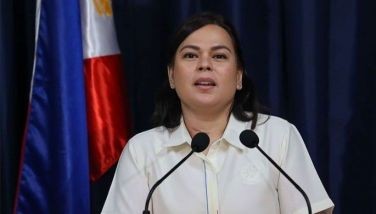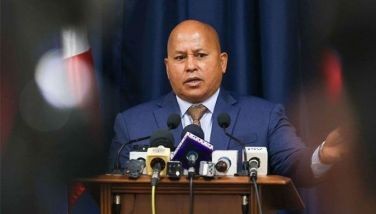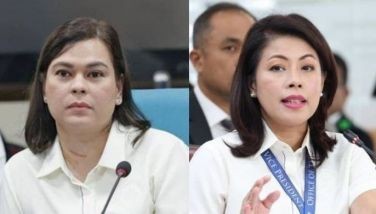CBCP, El Shaddai, Iglesia oppose Consa
May 13, 2003 | 12:00am
The Iglesia ni Cristo (INC) and El Shaddai religious movements said at a Senate hearing yesterday they are opposing any moves to implement Charter change this year.
The same stance was taken by the National Secretariat for Social Action-Justice & Peace (NASSA), the social action arm of the Catholic Bishops’ Conference of the Philippines (CBCP).
The two religious groups and other multi-sectoral organizations attended a hearing of the Senate committee on constitutional amendments yesterday.
The Senate committee, headed by Sen. Edgardo Angara, will resume the hearing on Charter change today.
INC spokesman Bienvenido Santiago said the government should not change the Charter — whether through constituent assembly or constitutional convention — at present "because the country has more urgent problems to address."
"We have the economic problem, a budget deficit which deprives the people of their right to a decent life. We are all witnesses to the rampant graft and corruption in the government, which has come to a nearly unbearable level. Foreign investors are now afraid to come to the country to invest. We also have the peace and order problem in Mindanao," he said.
Santiago said the INC will not object, if indeed there is a need to change the Constitution, but "the government should first set aside the move to amend the Constitution and devote its time to address the pressing problems (so they can) alleviate poverty" among the people.
El Shaddai spokesman Mel Robles, who attended the Senate hearing on Charter change yesterday, said changing the Constitution before the May 2004 elections would be considered "suspicious" by people.
"Changing the Constitution should be beyond suspicion. The timing is not right. There are other activities that could be done for our people. Any act to change the Charter at this time could lead to destabilization. We will support any form to change the Charter, but not at this time yet," he said.
Kalayaan College president Dr. Jose Abueva, for his part, said he does not oppose the proposed Charter change, but that the government should not "rush" in amending the Constitution. Abueva is a political science professor and a member of the Citizens Movement for a Federal Philippines.
The People’s Coalition Against ConAss, in a position paper, urged senators to reject House Concurrent Resolution 16, saying that a constitutional convention is the best mode to change the Constitution.
"If the ConAss plan succeeds, members of the House will continue to be elected in their districts with massive new powers in a parliamentary system. The Senate will be abolished. Are senators who support ConAss satisfied with promises of becoming deputy ministers in a parliamentary (system)? Do senators trust the Philippine’s most promising politician?" the coalition asked in a statement.
On the other hand, NASSA said it is vehemently against Charter change at this point in time.
In a resolution issued last May 9 in Cebu, NASSA believes it is "not timely" to advance Charter change, given the state of the economy and the peace and order situation of the country.
The CBCP’s social action arm, however, said it is open to amending the Constitution "when the right time comes," and perhaps, through a constitutional convention.
A constituent assembly, NASSA said, is "not acceptable," limiting and merely distracts government officials from responding to more urgent concerns such as poverty.
It also said that the issue of convening a constituent assembly has not been thoroughly discussed and debated at the grassroots level of society.
It added that a constituent assembly "limits the participation … only to people with vested interests."
A survey commissioned by the ruling Lakas party, however, said that Filipinos are now inclined to have the Charter amended before 2004.
The survey was conducted nationwide involving face-to-face interviews with 100 statistically representative respondents in each of the country’s 16 regions, a total of 1,600 respondents. It has an expected error margin of 2.5 percent at the 95 percent confidence level.
The survey, conducted from April 25 to May 4 by NFO-Trends, Inc., found that 50 percent of Filipinos agree that "the Senate and the House of Representatives should prepare to convene as a constituent assembly in order to discuss constitutional amendments." – With Katherine Adraneda, Perseus Echeminada
The same stance was taken by the National Secretariat for Social Action-Justice & Peace (NASSA), the social action arm of the Catholic Bishops’ Conference of the Philippines (CBCP).
The two religious groups and other multi-sectoral organizations attended a hearing of the Senate committee on constitutional amendments yesterday.
The Senate committee, headed by Sen. Edgardo Angara, will resume the hearing on Charter change today.
INC spokesman Bienvenido Santiago said the government should not change the Charter — whether through constituent assembly or constitutional convention — at present "because the country has more urgent problems to address."
"We have the economic problem, a budget deficit which deprives the people of their right to a decent life. We are all witnesses to the rampant graft and corruption in the government, which has come to a nearly unbearable level. Foreign investors are now afraid to come to the country to invest. We also have the peace and order problem in Mindanao," he said.
Santiago said the INC will not object, if indeed there is a need to change the Constitution, but "the government should first set aside the move to amend the Constitution and devote its time to address the pressing problems (so they can) alleviate poverty" among the people.
El Shaddai spokesman Mel Robles, who attended the Senate hearing on Charter change yesterday, said changing the Constitution before the May 2004 elections would be considered "suspicious" by people.
"Changing the Constitution should be beyond suspicion. The timing is not right. There are other activities that could be done for our people. Any act to change the Charter at this time could lead to destabilization. We will support any form to change the Charter, but not at this time yet," he said.
Kalayaan College president Dr. Jose Abueva, for his part, said he does not oppose the proposed Charter change, but that the government should not "rush" in amending the Constitution. Abueva is a political science professor and a member of the Citizens Movement for a Federal Philippines.
The People’s Coalition Against ConAss, in a position paper, urged senators to reject House Concurrent Resolution 16, saying that a constitutional convention is the best mode to change the Constitution.
"If the ConAss plan succeeds, members of the House will continue to be elected in their districts with massive new powers in a parliamentary system. The Senate will be abolished. Are senators who support ConAss satisfied with promises of becoming deputy ministers in a parliamentary (system)? Do senators trust the Philippine’s most promising politician?" the coalition asked in a statement.
On the other hand, NASSA said it is vehemently against Charter change at this point in time.
In a resolution issued last May 9 in Cebu, NASSA believes it is "not timely" to advance Charter change, given the state of the economy and the peace and order situation of the country.
The CBCP’s social action arm, however, said it is open to amending the Constitution "when the right time comes," and perhaps, through a constitutional convention.
A constituent assembly, NASSA said, is "not acceptable," limiting and merely distracts government officials from responding to more urgent concerns such as poverty.
It also said that the issue of convening a constituent assembly has not been thoroughly discussed and debated at the grassroots level of society.
It added that a constituent assembly "limits the participation … only to people with vested interests."
A survey commissioned by the ruling Lakas party, however, said that Filipinos are now inclined to have the Charter amended before 2004.
The survey was conducted nationwide involving face-to-face interviews with 100 statistically representative respondents in each of the country’s 16 regions, a total of 1,600 respondents. It has an expected error margin of 2.5 percent at the 95 percent confidence level.
The survey, conducted from April 25 to May 4 by NFO-Trends, Inc., found that 50 percent of Filipinos agree that "the Senate and the House of Representatives should prepare to convene as a constituent assembly in order to discuss constitutional amendments." – With Katherine Adraneda, Perseus Echeminada
BrandSpace Articles
<
>
- Latest
- Trending
Trending
Latest
Trending
Latest
Recommended




























